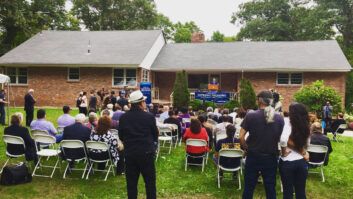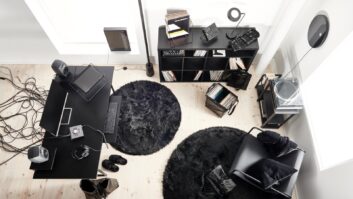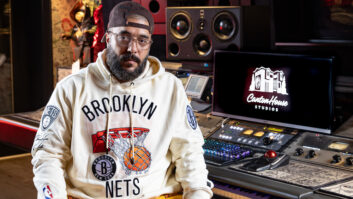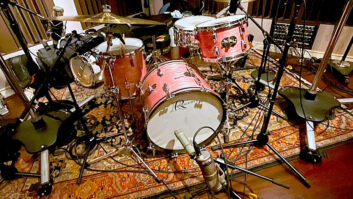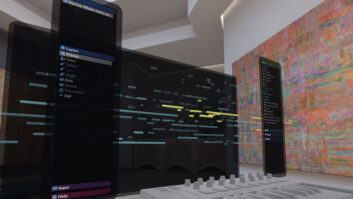TORRANCE, CA—When Sally House, executive director of The Hit House, and her husband, creative director Scott Miller, realized that clients were no longer attending sessions, they decided to relocate the business to their home, cutting out three hours of daily commuting. Initially, Miller and composer William Hunt worked out of a pair of backyard cabins, but earlier this year moved into permanent production facilities in a newly constructed extension to the couple’s house in a quiet neighborhood in Torrance.
Construction began around April, 2015 and was ready for move-in within a year. A good-sized room for Hunt, a double-height control room with attached tracking room for Miller and various additional office spaces and amenities were designed by Ken Goerres of Exakte Recording Studio Design, who also tuned the rooms. Robert Lyons at Champion Walls provided the comprehensive acoustic treatment in the two studios.
The principal focus at the custom music shop is trailers, mainly for motion pictures but also for video games, as well as for television commercials. Currently, for example, Hunt’s music—a track entitled “Payload”—can be heard in the Blade Runner 2049 spot, and recent campaigns for Valerian and Spider-Man: Homecoming also featured work from The Hit House.
The audio team also includes a third composer, Dan Diaz, who operates out of his home just up the 405 freeway in Culver City. Chad Hughes, a multiple Emmy Award-nominated sound designer, works out of a home studio near Temecula, in California’s Riverside County, on shows such as FOX’s Gotham.
This can be a fast turn-around business, says House. “We always have a deadline. Even when we’re not working on custom jobs, we always have our next album. Currently, we’re working on Kinetic Reaction 2.0, a fun action album. We brought the first one out at the beginning of the year. Normally we don’t do a sequel so quickly, but it was so successful—it was in TV spots for Wonder Woman, Spider-Man, Baywatch—that we’ve had music supervisors asking for another one.”
Miller had a heart-stopping moment shortly before the new studios came online. “Monday morning, one room had to be good to go. Saturday morning, I woke up at 6 a.m., so excited—it was the day I’d been waiting for,” he recounts. “We were setting up William’s room and the power supply in one little USB hub went wrong and fried his main computer; it melted the motherboard. We didn’t know what it was and plugged in his old computer—and it fried that as well.” Fortunately, the recovery process was relatively quick and painless, says Hunt, who worked in a room adjoining Miller’s while his system was restored.
“We were buying up gear for quite some time, ready for this,” continues Miller. “We knew we were going to have a tracking room, so it was a question of, what’s our vision down the road?”
That vision included a collection of microphones and mic preamps, but as it transpired, they have largely been redundant. “We got the Steven Slate mic. I haven’t pulled any mics out of boxes since we got it.” The Slate VMS virtual microphone system includes a neutral large diaphragm mic that, in combination with the VMS One preamp, can emulate the performance of numerous classic transducers.
“And you can keep changing it as you go,” he notes. “We have a couple of presets that we made for tracking. We have a vocalist who comes in, Ruby Friedman. Her voice is mammoth, so we have a setting for her.”
Freidman sang on “Hunt You Down,” a piece written by Miller and Hunt for PlayStation’s Bloodborne game commercial, for Petrol Advertising, a longtime client. Like a significant number of the compositions that come out of The Hit House, the song, in an extended, full-length version, has become a hit on iTunes and YouTube.
Because of the Slate VMS, some of Miller’s racked gear, including a Trident S20 dual mic preamp and a couple of 500 Series modules from Retro Instruments and Rupert Neve Designs, is rarely touched. But one new piece of gear that has been a game-changer for Miller, a guitarist, is Kemper’s profiling amplifier.
“It’s a god-send; one of the best things ever,” says Miller, who previously relied on a Mesa Boogie recording preamp, an analog unit with no recall. Now, Miller says, when a client revises a spot, perhaps extending it by a bar or two, he can refer to the original audio track, where he annotates the guitar and Kemper patch used.
Despite the pressure of deadlines, the team spend as much time as possible developing signature sounds. “I’m really into altering sounds; I’ll find a sound that I hear some potential in and then make it unique, or fit into something that we’re doing, using my go-to plug-ins,” says Hunt.
“There’s so much competition, so differentiation is key. Some of the most successful trailers and tracks are the ones that have a really unique portion that really stands out,” says House. “Our business is built around being unique. We do so many covers or interpretations that we have to find a unique way of doing that, so they find the right sounds before they even start writing.”
Slate Digital
slatedigital.com
The Hit House
thehithouse.com
